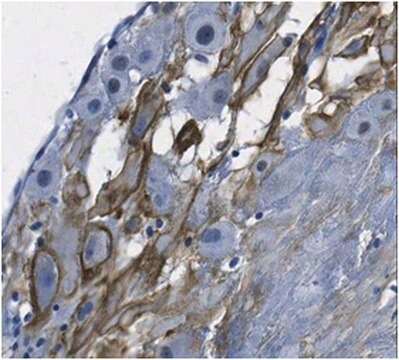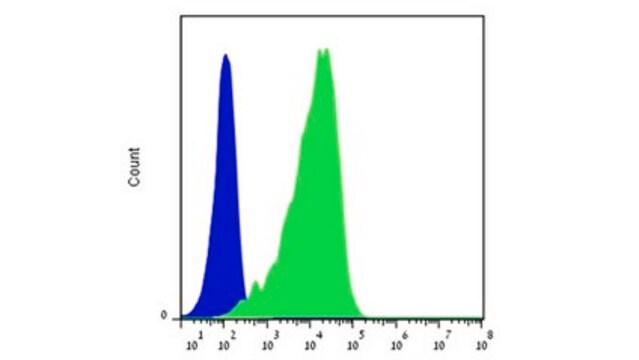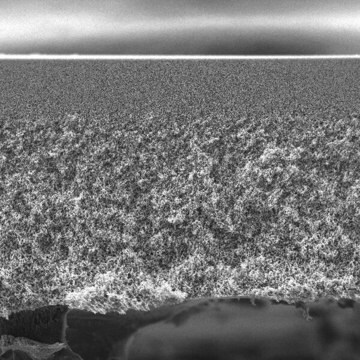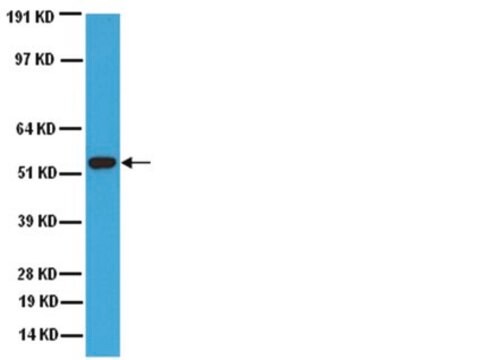MABS1266
Anti-LOX-1 Antibody, clone 15C4
clone 15C4, from mouse
别名:
Oxidized low-density lipoprotein receptor 1, Ox-LDL receptor 1, C-type lectin domain family 8 member A, Lectin-like oxidized LDL receptor 1, Lectin-like oxLDL receptor 1, hLOX-1, Lectin-type oxidized LDL receptor 1
登录查看公司和协议定价
所有图片(3)
About This Item
分類程式碼代碼:
12352203
eCl@ss:
32160702
NACRES:
NA.41
推荐产品
生物源
mouse
品質等級
抗體表格
purified immunoglobulin
抗體產品種類
primary antibodies
無性繁殖
15C4, monoclonal
物種活性
human
技術
flow cytometry: suitable
immunofluorescence: suitable
immunohistochemistry: suitable
western blot: suitable
同型
IgG2aκ
NCBI登錄號
UniProt登錄號
運輸包裝
ambient
目標翻譯後修改
unmodified
基因資訊
human ... OLR1(4973)
一般說明
Oxidized low-density lipoprotein receptor 1 (UniProt: P78380; also known as Ox-LDL receptor 1, C-type lectin domain family 8 member A, Lectin-like oxidized LDL receptor 1, LOX-1, Lectin-like oxLDL receptor 1, hLOX-1, Lectin-type oxidized LDL receptor 1) is encoded by the OLR1 (also known as CLEC8A, LOX1) gene (Gene ID: 4973) in human. LOX1 is a type II transmembrane receptor for oxidatively modified low density lipoprotein (oxLDL), a well-known marker of atherosclerosis. A free form of LOX-1 has also been reported. LOX-1 has a The C-type lectin domain that mediates the recognition and binding of oxLDL. Its cytoplasmic region is considered to be essential for subcellular sorting on the cell surface. LOX-1 is expressed at high level in endothelial cells and vascular-rich organs such as placenta, lung, liver and brain, aortic intima, bone marrow, spinal cord and substantia nigra. It is also expressed at the surface of dendritic cells. LOX-1 mediates the recognition, internalization and degradation of oxLDL by vascular endothelial cells. OxLDL induces vascular endothelial cell activation and dysfunction, resulting in pro-inflammatory responses, pro-oxidative conditions and also apoptosis. In addition to binding oxLDL, LOX-1 also acts as a receptor for the HSP70 protein involved in antigen cross-presentation to naive T-cells in dendritic cells, thereby participating in cell-mediated antigen cross-presentation. LOX-1 is up-regulated in atherosclerotic lesions, by oxLDL, reactive oxygen species and fluid shear stress.
特異性
Clone 15C4 recognizes LOX-1 in human cells.
免疫原
Human LOX 1 ectodomain-hIgGFc fusion protein.
應用
Detect LOX-1 using this mouse monoclonal Anti-LOX-1 Antibody, clone 15C4, Cat. No. MABS1266. It has been tested in Cell Differentiation studies, Flow Cytometry, Immunofluorescence, Immunohistochemistry, and Western Blotting.
Immunohistochemistry Analysis: A 1:250-1,000 dilution from a representative lot detected LOX-1 in human spleen, human large intestine, and human vagina tissues.
Flow Cytometry Analysis: A representative lot detected LOX-1 in Flow Cytometry applications (Li, D., et. al. (2012). J Exp Med. 209(1):109-21).
Immunofluorescence Analysis: A representative lot detected LOX-1 in Immunofluorescence applications (Li, D., et. al. (2012). J Exp Med. 209(1):109-21).
Cell Differentiation Analysis: A representative lot detected LOX-1 in Cell Differentiation applications (Joo, H., et. al. (2014). Immunity. 41(4):592-604).
Immunohistochemistry Analysis: A representative lot detected LOX-1 in Immunohistochemistry applications (Duluc, D., et. al. (2013). Microb Pathog. 58:35-44).
Flow Cytometry Analysis: 1 ug from a representative lot detected LOX-1 in one million A549 cells.
Flow Cytometry Analysis: A representative lot detected LOX-1 in Flow Cytometry applications (Li, D., et. al. (2012). J Exp Med. 209(1):109-21).
Immunofluorescence Analysis: A representative lot detected LOX-1 in Immunofluorescence applications (Li, D., et. al. (2012). J Exp Med. 209(1):109-21).
Cell Differentiation Analysis: A representative lot detected LOX-1 in Cell Differentiation applications (Joo, H., et. al. (2014). Immunity. 41(4):592-604).
Immunohistochemistry Analysis: A representative lot detected LOX-1 in Immunohistochemistry applications (Duluc, D., et. al. (2013). Microb Pathog. 58:35-44).
Flow Cytometry Analysis: 1 ug from a representative lot detected LOX-1 in one million A549 cells.
Research Category
Signaling
Signaling
品質
Evaluated by Western Blotting in human liver tissue lysates.
Western Blotting Analysis: 2 µg/mL of this antibody detected LOX-1 in 10 µg of human liver tissue lysates.
Western Blotting Analysis: 2 µg/mL of this antibody detected LOX-1 in 10 µg of human liver tissue lysates.
標靶描述
30.96 kDa calculated. Uncharacterized band(s) may appear in some lysates.
外觀
Protein G purified
Format: Purified
Purified mouse monoclonal antibody IgG2a in PBS without preservatives.
儲存和穩定性
Stable for 1 year at -20°C from date of receipt.
Handling Recommendations: Upon receipt and prior to removing the cap, centrifuge the vial and gently mix the solution. Aliquot into microcentrifuge tubes and store at -20°C. Avoid repeated freeze/thaw cycles, which may damage IgG and affect product performance.
Handling Recommendations: Upon receipt and prior to removing the cap, centrifuge the vial and gently mix the solution. Aliquot into microcentrifuge tubes and store at -20°C. Avoid repeated freeze/thaw cycles, which may damage IgG and affect product performance.
其他說明
Concentration: Please refer to lot specific datasheet.
免責聲明
Unless otherwise stated in our catalog or other company documentation accompanying the product(s), our products are intended for research use only and are not to be used for any other purpose, which includes but is not limited to, unauthorized commercial uses, in vitro diagnostic uses, ex vivo or in vivo therapeutic uses or any type of consumption or application to humans or animals.
未找到合适的产品?
试试我们的产品选型工具.
儲存類別代碼
12 - Non Combustible Liquids
水污染物質分類(WGK)
WGK 2
閃點(°F)
Not applicable
閃點(°C)
Not applicable
我们的科学家团队拥有各种研究领域经验,包括生命科学、材料科学、化学合成、色谱、分析及许多其他领域.
联系技术服务部门








